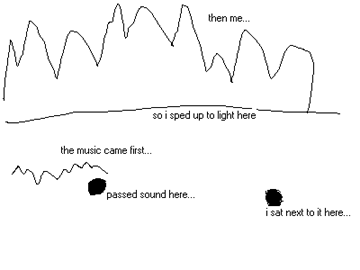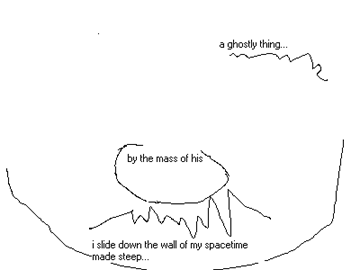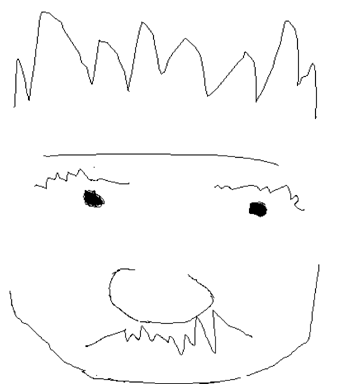MASS
Lieserl – age 18, dark, serious girl. Dressed for today’s weather, but her clothes are dark and reminiscent of late 19th century style.
Setting: Today, somewhere nearby. A simple over-head projector nearby.
NOTES: The public first became aware of Einstein’s first illegitimate daughter, Lieserl, in 1987 when the first volume of his collected papers was published. Lieserl was born to Albert Einstein and Mileva Maric in 1902, two years before they officially married. She was born in Mileva’s home-town in Serbia and was given to members of Mileva’s family to raise. Albert was not there at the birth, nor did he ever, as far as we know, see his first daughter as he was scraping a living tutoring and working at a Swiss patent office. Know one knows what happened to their baby girl.
Time is the unfolding of statistics. A catalog of outcomes delighted in their out-coming. Chance chanced. There is a chance that most things could happen. A ball might penetrate a steel wall if I threw it enough times. My perfume might gather itself back in its bottle if I waited long enough. I might… fly.
I was born. That I know.
My mother screamed. So, I did too. She cried. I gathered this was the way. She looked at me so sadly. And I stared back at her, confident I was learning. She held me. Tightly. I bit her breast, sharing this pressure. We were communicating. A harsh thing when one person knows something the other doesn’t. She wouldn’t tell me something. Something she was certain of but couldn’t articulate to a child. A baby girl. A thing as I was, that asked so much but never quite advised.
She sat with me. In the quiet of a basement secret, the stillness of a new idea.
Soon, seeping into my room I heard Mozart coming from her past. A violin playing Mozart; and quite well. A confidant player. Apt but somewhat… aimless. He played for passion, not just to impress. Though he did. Impress. He must have squinted when he played.
He. I heard a man playing, not a woman. Who. He. This music was not my mother’s, though she memorized it. Who was this music. This Mozart. Who played her. For her. Who did she memorize?
My father. Girls have fathers and mine was… absent. Fascinated. This man who played music and shared this woman. This woman I hurt. This large woman that I woke at night and pinched and bit. Who shares this woman. Why is he not pained like she. Where is this man who tricks and plays and promises answers, larger questions. Who.
She left me. I believed her when she said we would meet again. So I let her go. Believing in memory as a tangible promise, a solid thing that she could see and taste. I left her my memory and took from her a promise. She had given me, given, given away to family or friends or… nothing. But I was too smart to be given anything without a return offer. She left me in a cold part of the world and went to find this music, this man. So I took, stole a piece of her for me. She wasn’t looking. She wouldn’t notice. Promise me.
I waited til I could stand. Which I did holding on to a chair. I waited again til I could walk. A tour around the kitchen. I learned to run. Then to fly. Then I found my mother’s promise in the bed I used to sleep in when I was a baby. It glowed. And played Mozart.
I ran. I flew. Chasing this music. I hurried through the air, slept with the wind, and gained speed and time as I approached the sound of this… this promise. I reached for this noise, rising as I got close. And finally sailing side by side I caught it
and it stopped.
The fury soaring sound I chased for all that time silenced when I finally touched it.
My mother’s sad face came back but only made me go faster. My father must live beyond this music, past this speed. Starting in my toes, I ran on a force and left that sound behind. I saw it ache to be the fastest thing but I out-flew it by miles. Then years. The acceleration was a heart-soar, a hunt I’d accidentally committed to, a love I’d accidentally committed to.
And love is massive. So when it ceases to be it is not a whisper that passes but a rush of energy that forces me at such speeds that I see things bend that should not bend. Time and light and hope.
Light bends when you’re looking so hard for something so large as a promise. I saw it bend as I came upon it, faster and faster approaching some speed I only recognized as instinct. I was disappearing from being born. From being born in a town to a mother that cries to a father that distance made weak.
And then I rode with it. Side by side. I met. Light.
Let me explain.
(she turns on the projector draws)

the music came first, then me. After I passed the sound, here, I was past any convincing so I sped up to light, here. I sat next to it, here. Then here became here as I realized that it was always out there in front of me. I saw it and when I did –
(she turns off the projector)
I stared at it like my mother taught, saw the pause that overtakes when one shares speed with such a thing. The pause that never arrests such a thing. There is only forever in such a thing even when you sit with it, together, calm, asking it questions. I knew I would never be so bold as such a thing; going forever checked not by company or memory or promise.
So. I turned around. My father was not out here in this pantheon. He had already left out here. And it was colder here than Serbia. I went home.
But. I was late. A hundred years. I chased my father’s music, passed it for his light, and missed him all in all. I heard he was a genius. My mother was brilliant, too. My brothers were kind. And I was… lost. A mystery. A baby. A story with no ending. Because I flew. No ending.
Time is a flexible thing. A progressive statistic proving that things, in fact, happen. Today. I came home and things had happened. His music, I found, had happened. Anyone could play it with some practice. Anyone could explain him to me, with some tutoring. Anyone could tell me what he looked like, what he wore, where he lived.
I would like to tell him what I saw. What really happened. There is a chance I could… a chance I could catch up with his history. Fly away again in time to meet him. To meet him and my mother. To not be created or destroyed but simply happen… to each other.
There is a chance that most things could happen. And I suppose I must live in what could happen. For I was too much for did happen, and not enough for what should have happened.
For a man who apparently re-arranged the world, let it breathe like it wanted to, attracted both mystery and definition… I am left confused. Lost. In love with an idea of what was not mine. I can’t help it.
(She turns on the projector, a new sheet for drawing)

I slide down the wall of my space made steep by the mass of his. See? I fall into his company made obvious but still invisible. A ghostly thing. I wish Newton had been right, and things attracted each other, perhaps not equally but at least consistently. There should be a pull between things, there should be a corporate influence, something instead of one thing denting this fabric, and everyone left to skim and skate within someone else’s dimensions.
But Newton was not wholly right. And there are smaller things inside of smaller things that move in their own directions. That play games you can’t see with rules you can’t judge. And in times like these you must do what you can with what you can’t see. A special kind of faith. Not the god kind. The earth kind.
I’ve seen. With my father’s eyes. I have speed. Relative to everything he had, yes, but it is mine. Not his. It’s sort of sad. Because I know he would have loved it. My speed. That makes me fly. That makes me sleep with light, and disappear, and be born, and call this mine, and call this home, and be all daughter, and passion, and memory and secret.
(She places each sheet back on the projector. It forms a caricature of Einstein.)

References:
Kaku, Michio. Einstein’s Cosmos: How Albert Einstein’s Vision Transformed Our Understanding of Space and Time, April, 2004. W. W. Norton & Company; NY, NY
Overbye, Dennis. Einstein in Love. October 1, 2000; International Thompson Publishing
Zackheim, Michele. Einstein’s Daughter: The Search for Lieserl, Nov. 1, 2000. Riverhead Trade